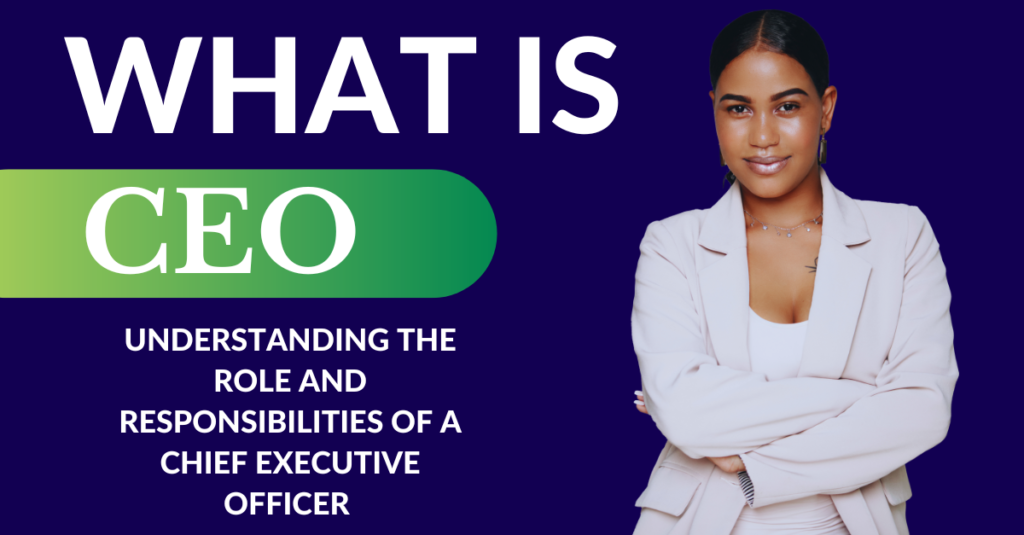What is CEO? Understanding the Role and Responsibilities of a Chief Executive Officer
Introduction
In today’s corporate landscape, the title of CEO, or Chief Executive Officer, commands significant respect and influence. Often referred to as the top executive or the head honcho, the CEO is a pivotal figure responsible for shaping the destiny of a company. But what does it truly mean to be a CEO, and what are the core responsibilities that come with this prestigious position? In this article, we will explore the multifaceted role of a CEO, delve into their key responsibilities, and shed light on the qualities and skills that make them successful leaders.
- The CEO Defined:
At its core, a CEO is the highest-ranking executive in an organization. The CEO’s primary responsibility is to provide strategic leadership, making critical decisions that drive the company towards its objectives and goals. This individual holds a significant level of authority and plays a vital role in setting the company’s vision, shaping its culture, and guiding its overall performance.
- The CEO’s Position in the Corporate Hierarchy:
In the corporate hierarchy, the CEO resides at the pinnacle. They report directly to the board of directors and are ultimately accountable to the company’s shareholders. The CEO holds the reins of power, leading other executives and managers, and spearheading initiatives that will have a profound impact on the organization’s future.
- Qualities and Skills of a CEO:
A successful CEO possesses a unique set of qualities and skills that distinguish them as exceptional leaders. While the specific traits may vary depending on the industry and the company’s nature, some common qualities define a proficient CEO.

1. Leadership and Vision: CEOs are visionary leaders who can see beyond the present and chart a course for the future. They inspire and motivate their teams to work towards a common goal, instilling a sense of purpose and direction.
2. Strategic Thinking: CEOs are adept at formulating and executing long-term strategic plans. They analyze market trends, evaluate competition, and identify opportunities that can propel the company forward.
3. Decision-making Abilities: CEOs face numerous complex decisions daily. They must be capable of making tough calls promptly, balancing risks and rewards, and standing by their choices.
4. Communication and Interpersonal Skills: Effective communication is essential for CEOs. They must articulate their vision clearly to stakeholders, employees, and the public. Additionally, they must be skilled listeners, valuing input from their teams and actively seeking feedback.
5. Adaptability and Resilience: The business landscape is ever-changing, and CEOs must be adaptable to navigate through uncertainty. They should exhibit resilience in the face of challenges and setbacks, motivating others to do the same.
- Responsibilities of a CEO:
The role of a CEO is all-encompassing, covering a wide range of responsibilities that are fundamental to the success of the organization. Some of the key duties include:

1. Setting the Company’s Vision and Mission: The CEO plays a pivotal role in defining the company’s vision and mission, charting the path that guides the organization’s growth and development.
2. Formulating and Executing Strategic Plans: CEOs work closely with other executives to develop comprehensive strategic plans that outline the company’s objectives and the steps needed to achieve them.
3. Ensuring Organizational Alignment and Cohesion: A crucial responsibility of the CEO is to ensure that all departments and teams within the organization are aligned with the overall vision and work in harmony to achieve common goals.
4. Managing Company Resources Effectively: CEOs are responsible for allocating resources, including finances, personnel, and technology, to maximize productivity and efficiency.
5. Fostering a Strong Corporate Culture: The CEO is the custodian of the company’s culture, values, and ethics. They set an example for employees and promote a positive work environment that encourages collaboration and innovation.
- CEO and Corporate Governance:
Corporate governance plays a critical role in the CEO’s responsibilities. The CEO must work closely with the board of directors to ensure the company operates within legal and ethical boundaries. Transparent communication with the board, shareholders, and stakeholders is vital to building trust and credibility.
- CEO Succession Planning:
An essential aspect of a CEO’s role is planning for their own succession. While being a visionary leader is vital, a responsible CEO also identifies and grooms potential successors to ensure the continuity of the company’s leadership.
- Examples of Iconic CEOs:
Throughout history, certain CEOs have left an indelible mark on their companies and industries. Examining their profiles and accomplishments can provide valuable insights into the qualities that make a CEO successful and influential.
- Diversity in CEO Positions:
Historically, the CEO position has been predominantly occupied by men, but the landscape is evolving, with more women and individuals from diverse backgrounds assuming the role. Emphasizing the importance of diversity in leadership roles is essential for driving innovation and progress within organizations.
- Challenges and Pressures Faced by CEOs:
CEOs operate in a high-pressure environment, facing numerous challenges such as economic fluctuations, technological disruptions, and geopolitical uncertainties. They must navigate these obstacles while maintaining the company’s stability and growth.
Conclusion
In conclusion, the CEO is the lynchpin that holds a company together, guiding it towards prosperity and sustainability. Their visionary leadership, strategic thinking, and ability to adapt in the face of challenges define their success. The position of a CEO is more than a job title; it is a call to lead, inspire, and shape the future of an organization, leaving an enduring impact on the world of business. Understanding the pivotal role of a CEO can provide aspiring leaders and business enthusiasts with valuable insights into the complex and fascinating world of corporate leadership.

My name is Rohit Vagh and I’m a content writer specializing in fashion and lifestyle. I have three years of experience in this field and have written various articles. My writing style is creative and engaging, and I strive to create content that resonates with my readers. I have a deep passion for fashion and am constantly researching the latest trends and styles to make sure my readers are up to date. I’m excited to continue my career in blogging, and I’m always looking for new opportunities in the fashion and lifestyle space.





